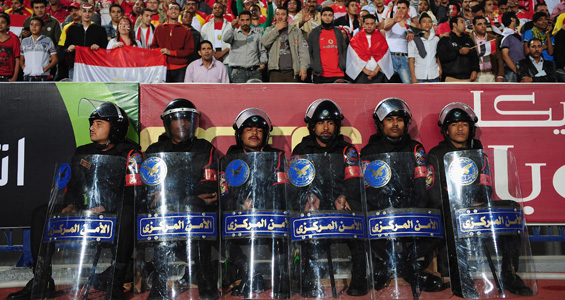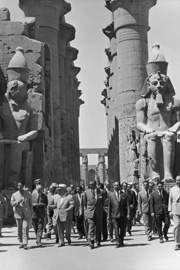The politics of sporting rivalry
Does the Egypt-Algeria football feud reveal a narrow nationalism in the Arab world?

 |
| Security was tight at the game between Egypt and Algeria in Cairo last week [GALLO/GETTY] |
The hooliganism and violence that have accompanied the football matches between Egypt and Algeria as they each seek to qualify for the 2010 World Cup have brought something new to Arab sports and political cultures.
The vehemence, fanaticism, and recriminations that were blatantly expressed in the media and on the streets of Algeria, Egypt, and Sudan [the host country where the deciding final game is to be played] all point to a trend. This is the logical outcome of the narrow nationalism that has prevailed in Arab politics since the death of Gamal Abdel Nasser, the former Egyptian president.
There are two forms of nationalism in the Arab world. The first is the larger Arab nationalism (often called pan-Arabism in the West) that seeks to unite all Arabs in one all-encompassing Arab state.
This was Nasser’s agenda; he mobilised the Egyptians and Arabs behind the slogans of Arab unity and Arab brotherhood/sisterhood. His plan, however, posed a threat to all Arab regimes; even the Arab nationalist Baath Party was nervous about Nasser’s plan because it meant they would lose power in Syria and in Iraq.
The party was more interested in preserving power in narrowly based regimes in Syria and in Iraq than in serving the goals of their own ideology.
Nationalist rhetoric
The Arab nationalist rhetoric struck a chord: Nasser became the sole and undisputed leader of the Arab people, preaching over the heads of most Arab leaders. But his was not the only plan in the region; Saudi Arabia and its allies presented an alternative in which Arabs lived and settled within the confines of their own small (or large) states.
 |
| Egyptian President Nasser at Luxor [GALLO/GETTY] |
This brand is referred to as narrow nationalism (known as qutri nationalism in Arabic). It was, of course, more appealing to the regimes because it meant that they preserved the borders of the states over which they ruled.
Nasser’s death created a golden opportunity for supporters of qutri nationalism. The Baath party, which was not serious about Arab unity, splintered into branches in Syria and Iraq, and the ensuing feud between the two factions became one of the most bitter and violent in contemporary Arab politics.
Nasser’s successor, Anwar Sadat, wanted to steer Egypt away from all-Arab concerns and wanted to reach a peace agreement with Israel. It was an agreement that would align his country with the US, and would insulate Egypt from the Arab responsibilities of the conflict with Israel.
He reverted to a narrow and chauvinist form of nationalism based on Pharaonic identity. Such ideas had existed in Egypt before the 1952 Revolution, and when he came to power, he breathed new life into them.
These fit into his peace plans with Israel; ideas of Egyptian superiority vis-à-vis all Arabs were quite useful for him to explain away the isolation that Egypt suffered in the wake of his trip to Israel.
To make a clear break with the past, Sadat attacked Libya without warning and had to be pressured by the US to halt the attack before it escalated into a regional war.
Reversion to ancient history
But it would be unfair to pin this narrow nationalism on Sadat alone – all Arab governments followed suit and reverted to their ancient history to instill a sense of superiority among their populations.
In Lebanon, the Phalanges Party was resoundingly defeated in the Civil War, but its nationalist ideas spread to several sects in Lebanon. Meanwhile, the Arab nationalist Saddam Hussein was invoking images, symbols, and events from the ancient pre-Islamic history of Iraq.
The more recent explosion of Arab satellite stations has not been used to unite Arabs, but to divide them increasingly further apart. Differences have been reinforced and Arab commonalities constantly denied, especially in the Saudi-controlled Arab media (the bulk of Arab media are controlled directly or indirectly by the Saudi royal family and its business affiliates).
Sports shows and the plethora of music talent contests were intended to highlight differences among the Arabs and to urge the public to rally behind the flag of their countries. Saudi media still engages in battle with Nasser; the humiliation that the Saudi royal family suffered as a result of his policies has been neither forgotten or forgiven.
A document that was leaked in US media showed that the Pentagon planned to launch an Iraqi version of the popular television programme American Idol in order to help instill a sense of Iraqi nationalism. It is clear that these sports and arts competitions and rivalries are not as spontaneous as some would believe.
|
‘Regimes would rather their people watch sports than follow the daily scenes of oppression in Palestine’ As’ad AbuKhalil |
Instead, they come from decades of state-sponsored mobilisation and agitation behind the flag of individual Arab countries. That it has expressed itself in violence is actually an indication that qutri nationalism has worked, up to a point.
The cult of sports in Arab media is another factor in this phenomenon. Sports are a safe distraction for the public; regimes would rather that their people watch sports than follow the daily scenes of oppression and carnage in Palestine, for example.
Reduced political attention
The culture of arts and sports was created to reduce the political attention of the public. Arab media devote an enormous amount of time and resources to sports coverage, especially to the achievements of state teams.
This narrow chauvinism and the association of national pride with the victory of state teams has become a staple of regime policies.
The battle on Facebook between Egyptian and Algerian football fans reveals the extent to which Arab youth are tuned in to the nationalist paradigm. The performance of the teams reflect on the reputation of the regimes themselves.
This helps explains why senior princes run the football teams in some Arab countries. Saddam put his own son in charge of the Iraqi Olympic committee. And Jibril Rajjub, one of Palestinian leader Yasser Arafat’s former security chiefs, now runs the Palestinian football committee.
All sports are political in the Arab world, and that makes sports dangerous, and potentially violent.
As`ad AbuKhalil is a professor of political science at California State University, Stanislaus, and author of the Angry Arab blog.
Al Jazeera is not responsible for the content of external websites.
The views expressed in this article are the author’s own and do not necessarily reflect Al Jazeera’s editorial policy.